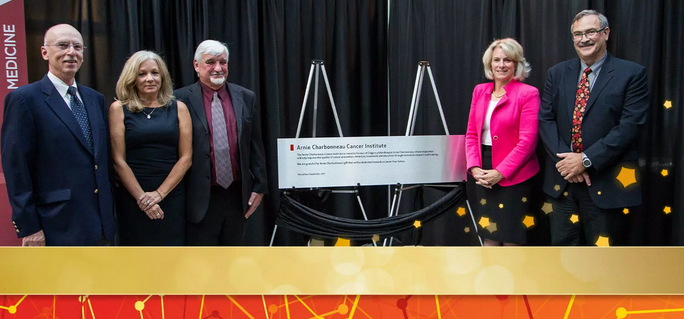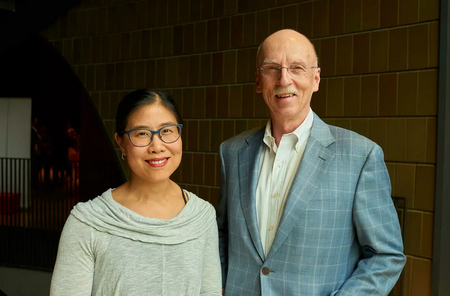Author: Sheri Block, Cumming School of Medicine with files from Allie Miller
A candid conversation at a restaurant near the Tom Baker Cancer Centre led to a gift that altered the trajectory of cancer research in Calgary, with impacts across Canada and around the globe.

From left, Greg Cairncross, former director of the Arnie Charbonneau Cancer Institute; Sandy Charbonneau; Arnie Charbonneau; Elizabeth Cannon, former UCalgary president; and Jon Meddings, past dean of the Cumming School of Medicine, pose for a photo after the official naming of the Arnie Charbonneau Cancer Institute in 2015. Photo Credit: UCalgary files
It was October 2013. Dr. Greg Cairncross, MD, a clinician-scientist and neuro-oncologist by training, had just become the newly minted director of the Southern Alberta Cancer Research Institute (SACRI). Introduced by a fellow colleague, oncologist Dr. Gwyn Bebb, Cairncross was sitting down across the table from Mr. Arnie Charbonneau.
"He was a very nice man, big guy, big personality, he was a businessman. It was easy to see why he was successful," recalls Cairncross of the initial meeting between him and Charbonneau. The Calgary businessman was facing a cancer diagnosis, and his experience made him keenly interested in improving cancer research and care in Calgary.
The two men talked about the current state of cancer research in Calgary at SACRI. They shared a similar vision on how to broaden its reach and impact. Cairncross was interested in growing the institute to improve the lives of cancer patients both in Calgary and around the world.
"That was the dream," says Cairncross.
It resonated with Charbonneau and on March 17, 2014, the dream became a reality. Charbonneau made a transformational gift to the University of Calgary, leading to a new name for SACRI: the Arnie Charbonneau Cancer Institute (ACCI) at the Cumming School of Medicine (CSM).
10 years of cancer research excellence
A decade after Charbonneau's gift, the institute is certainly delivering on that dream.
Dr. Jennifer Chan, MD, a clinician-scientist and neuropathologist, has taken the reins from Cairncross as the current director of ACCI. Starting as deputy director in 2014, she has witnessed the transformation and says the growth of the institute over the past 10 years has been tremendous.
"The biggest difference is in the connecting of dots," she says. "We're breaking down silos. We are working together with provincial partners such as Alberta Health Services, with other Canadian universities, with research collaboratives such as the Marathon of Hope Cancer Centres Network, and with international groups and teams. We're more
One of seven research institutes at the Cumming School of Medicine (CSM), the Charbonneau institute brings together more than 200 clinicians and scientists who are translating leading-edge discoveries about cancer into new clinical applications for diagnosis and treatment. Through cancer research, they are focused on preventing, detecting, and diagnosing cancer, while concentrating on the well-being of those affected by cancer.
Philanthropy powers impact
Today, the ACCI has national and international impact as a research leader in several areas. The research spans the spectrum from harnessing data to inform cancer screening and detection, to developing new precision treatments, such as immunotherapy, to psychosocial oncology and survivorship. Charbonneau's gift sparked momentum at the institute, which has inspired hundreds of other donors to make gifts both large and small all contributing to meeting the cancer challenge together.
Thanks to groundbreaking research conducted by psychosocial oncologists here in Calgary, we now recognize cancer-related distress as a sixth vital sign' of cancer care, and screening for distress has been implemented across the globe. Within the CSM, the institute is recognized by the World Health Organization for its efforts on how to treat the whole patient by identifying and reducing distress as well as improving long-term survivorship outcomes.
In 2022, a gift from Patrick Daniel and his family funded a new research chair in psychosocial oncology to further this work, while donors to the Button Family Initiative in Pediatric Psychosocial Oncology supported research benefiting younger cancer patients.
The institute is also leading the way in cancer prevention and screening. The Cancer Screening, Detection, and Risk Reduction Research Program, also known as CanDoR, brings together a team of epidemiologists, clinicians, biostatisticians, and computer scientists who use a unique set of tools and national data to look at ways to decrease cancer. This work is moving forward thanks to the generosity of donors such as Glen and Erin Rumpel.
Personalized immune cell therapy breakthrough
The Charbonneau Institute is making major strides in cancer immunotherapy leveraging the body's own immune cells to fight cancer. Calgarian Milan Heck has played an important role in advancing research in this area. In the summer of 2015, Heck was only 15 years old when she discovered a small lump on her hip that turned out to be a tumour. The teenager was diagnosed with alveolar soft part sarcoma (ASPS), a rare cancer that starts in the soft connective tissues of the body but can metastasize to other organs.
Doctors went on to discover a lesion on her brain and 13 lesions on her lungs. Over the next six years Heck underwent nine surgeries, two rounds of radiation and has been on numerous medications.
"I think the effects of cancer physically and psychologically are something that you actually live with for life. You're never really done. And that's been a heavy thing to understand," says Heck.
During her treatment, she was approached to donate samples of her tumour to the Clark H. Smith Tumour and Tissue Bank at the ACCI.
In 2021, Charbonneau researchers started testing whether re-engineered immune cells would attack her cancer cells in laboratory models. The study, conducted on mice, proved the modified immune cells eliminated her cancer cells.
"That's kind of when I was like, Wow, this has some traction,'" recalls Heck, who completed a Bachelor of Health Sciences degree at the University of Calgary and is now a research assistant in immunology at the CSM.

Jennifer Chan and Greg Cairncross // Photo Credit: Charbonneau Cancer Institute
Just two years later a clinical trial is now underway to test this immunotherapy in patients who have exhausted all other treatment options. This is the first time Canadian scientists have invented, manufactured and delivered this treatment for solid tumours to a patient in Canada.
The potential impact not just for Heck, but for others with cancer, could be life-changing.
"It's important because it's the difference between me having perhaps debilitating loss of function for the rest of my life versus a targeted treatment where I can have a somewhat normal future," says Heck.
This groundbreaking research was made possible by a foundational donation from the Riddell family in 2023, creating the Riddell Centre for Cancer Immunotherapy, which includes Charbonneau members.
Heck is grateful for the research that is being done.
"It really is offering an opportunity to myself and other patients to live somewhat normal lives and that's a huge thing."
Looking ahead
The outlook for the ACCI continues to grow and evolve. Arnie Charbonneau's gift helped transform the institute from excelling at discovery science to excelling at testing and translating its research into new treatments in the clinic, where patients can benefit from them.
"Impacting patient care is the No. 1 goal here," says Chan. "So, no matter where on that spectrum of research you are, real-world impact drives every research question we investigate Mr. Charbonneau's gift has made it possible."
This fall, the Arthur J.E. Child Comprehensive Cancer Centre, the largest tertiary cancer centre in Canada, is set to open in Calgary. Charbonneau researchers will work shoulder-to-shoulder with clinicians and patients in the new centre to develop cutting-edge technologies, treatments and new strategies for earlier detection and prevention faster. Thousands of donors have given through the OWN.CANCER campaign to make the centre one of the world's best in research and care.
From recruiting the brightest researchers, to training tomorrow's research leaders, to capitalizing on new technologies, it couldn't be done without the power of philanthropy.
"Over the first 10 years, philanthropy pulled us together it made us a team," says Chan, who adds future philanthropy will continue to fuel growth. "Today, we have exciting science coming from our investigators and we're working with others here and beyond. In some areas, we are leading the progress for Canada and in some areas, for the world."
The Arnie Charbonneau Cancer Institute is a community of researchers, clinicians, and educators dedicated to a cancer-free future. Charbonneau is celebrating 10 years of meeting the cancer challenge together through discovery and innovation in basic and applied research. The institute brings together scientists and physicians to integrate research and care across disciplines from understanding and preventing cancer, to transforming its detection and treatment, to improving life with and after cancer. Our members include researchers at the Tom Baker Cancer Centre and the University of Calgary's Cumming School of Medicine and Teaching Hospitals. Learn more about Charbonneau










